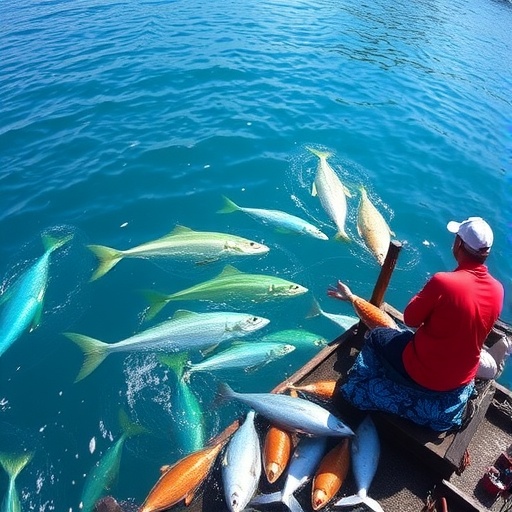The blue economy stands at the forefront of contemporary discussions about sustainable resource management, particularly in the realms of fisheries and aquaculture. A recent study led by M. Samy-Kamal delves into the intricate connections between these sectors and their impact on food security in Egypt. As the global population continues to swell, with projections suggesting a rise to nearly 10 billion by 2050, the pressure on food production systems, especially those reliant on marine resources, is more pressing than ever. Understanding how to harness the potential of a blue economy will be pivotal for countries like Egypt, where traditional fishing practices not only provide livelihoods but also contribute to national food security.
Within the context of sustainable fisheries, Egypt’s geographical positioning along the Mediterranean Sea and the Red Sea reveals vast opportunities for enhancing aquatic resource management. The concept of the blue economy emphasizes the need for an integrated approach that considers environmental sustainability alongside economic viability. Samy-Kamal suggests that adopting innovative aquaculture techniques and improving fish stock management can alleviate overfishing pressures while providing adequate nutrition to the population, thus reinforcing the link between sustainability and food security.
Aquaculture, in particular, has the potential to significantly elevate fish production rates. As traditional fish stocks dwindle due to unsustainable fishing practices, many countries are looking towards aquaculture as a viable solution. The study discusses how Egypt can leverage its rich aquatic environments for aquaculture to ensure a stable and resilient food supply. By investing in research and development for sustainable aquaculture technologies—such as recirculating aquaculture systems (RAS) or integrated multi-trophic aquaculture (IMTA)—Egypt can not only increase its fish output but also minimize environmental impacts typically associated with traditional fish farming.
Moreover, the blue economy approach goes beyond mere fish farming; it encompasses the entire marine and coastal ecosystems, recognizing their pivotal roles in supporting biodiversity and resilience against climate change. The study outlines the need for policies that promote sustainable practices across all marine-related sectors. This holistic viewpoint is essential for addressing the multifaceted challenges that fisheries and aquaculture face, from the impact of climate change to the socio-economic disparities that often accompany resource exploitation.
One of the most compelling aspects of Samy-Kamal’s research is the emphasis on community engagement in the transition to a blue economy. Local fishing communities play a crucial role in managing and conserving aquatic resources. Therefore, involving these stakeholders in the decision-making processes around fisheries policies and management strategies is vital. By fostering a sense of ownership among local populations, policies can be tailored to meet the specific needs of those who depend on these resources, ensuring that both environmental and social sustainability are achieved.
In addition to fostering local engagement, the research highlights the significance of innovation and technology in revolutionizing Egypt’s fisheries sector. From enhanced fishing gear to data-driven fishery management systems, technology has the potential to optimize resource use and improve monitoring efforts. The implementation of digital platforms for real-time data collection and sharing can empower local fishers with vital information on stock levels and optimal fishing times, thus promoting sustainable practices and increasing yields.
Furthermore, the research underscores the importance of establishing robust regulatory frameworks that not only protect marine ecosystems but also support economic activities in the fishing and aquaculture sectors. Effective regulation is essential in mitigating the effects of illegal, unreported, and unregulated (IUU) fishing, which poses significant threats to sustainable fisheries management. By strengthening governance structures and enhancing compliance mechanisms, Egypt can safeguard its marine resources for future generations while simultaneously supporting local livelihoods.
The economic implications of a blue economy are significant, presenting opportunities for job creation and economic resilience within rural communities. As Egypt looks to modernize its fisheries and aquaculture sectors, aligning strategies with the principles of the blue economy will enable the country to tap into global markets for sustainably sourced seafood. This not only provides economic benefits but also enhances Egypt’s position as a leader in sustainable fisheries in the region.
However, transitioning to a blue economy is not without its challenges. Climate change impacts, such as rising sea temperatures and ocean acidification, threaten the health of marine ecosystems. The study calls for adaptive strategies that can help mitigate these impacts. Research into climate-resistant fish species and sustainable fishing practices will be essential to ensure the long-term viability of fisheries and aquaculture in Egypt.
In conclusion, Samy-Kamal’s study paints a hopeful picture of how Egypt can embrace the blue economy to secure its food future while enhancing the health of its marine ecosystems. By fostering sustainable practices, engaging local communities, leveraging technology, and establishing strong regulatory frameworks, Egypt can navigate the complex challenges facing its fisheries and aquaculture sectors. The convergence of these efforts will not only contribute to national food security but also promote broader socio-economic benefits, underscoring the importance of a resilient and sustainable approach to the utilization of marine resources.
The insights from this research are timely and relevant as they align with the global call for sustainable development and conservation efforts. Governments and stakeholders at all levels must take note of the valuable lessons presented in this study as they work towards creating a more sustainable future for fisheries and aquaculture worldwide. The journey towards a blue economy in Egypt is a path worth investing in, for the benefits will resonate far beyond its shores, influencing food security and sustainable development efforts globally.
Subject of Research: Blue economy for sustainable fisheries and aquaculture in Egypt.
Article Title: Blue economy for sustainable fisheries and aquaculture in Egypt: Towards resilient food security.
Article References:
Samy-Kamal, M. Blue economy for sustainable fisheries and aquaculture in Egypt: Towards resilient food security. Ambio (2025). https://doi.org/10.1007/s13280-025-02294-7
Image Credits: AI Generated
DOI:
Keywords: Blue economy, sustainable fisheries, aquaculture, food security, Egypt, marine ecosystems, local communities, climate change, economic resilience.




